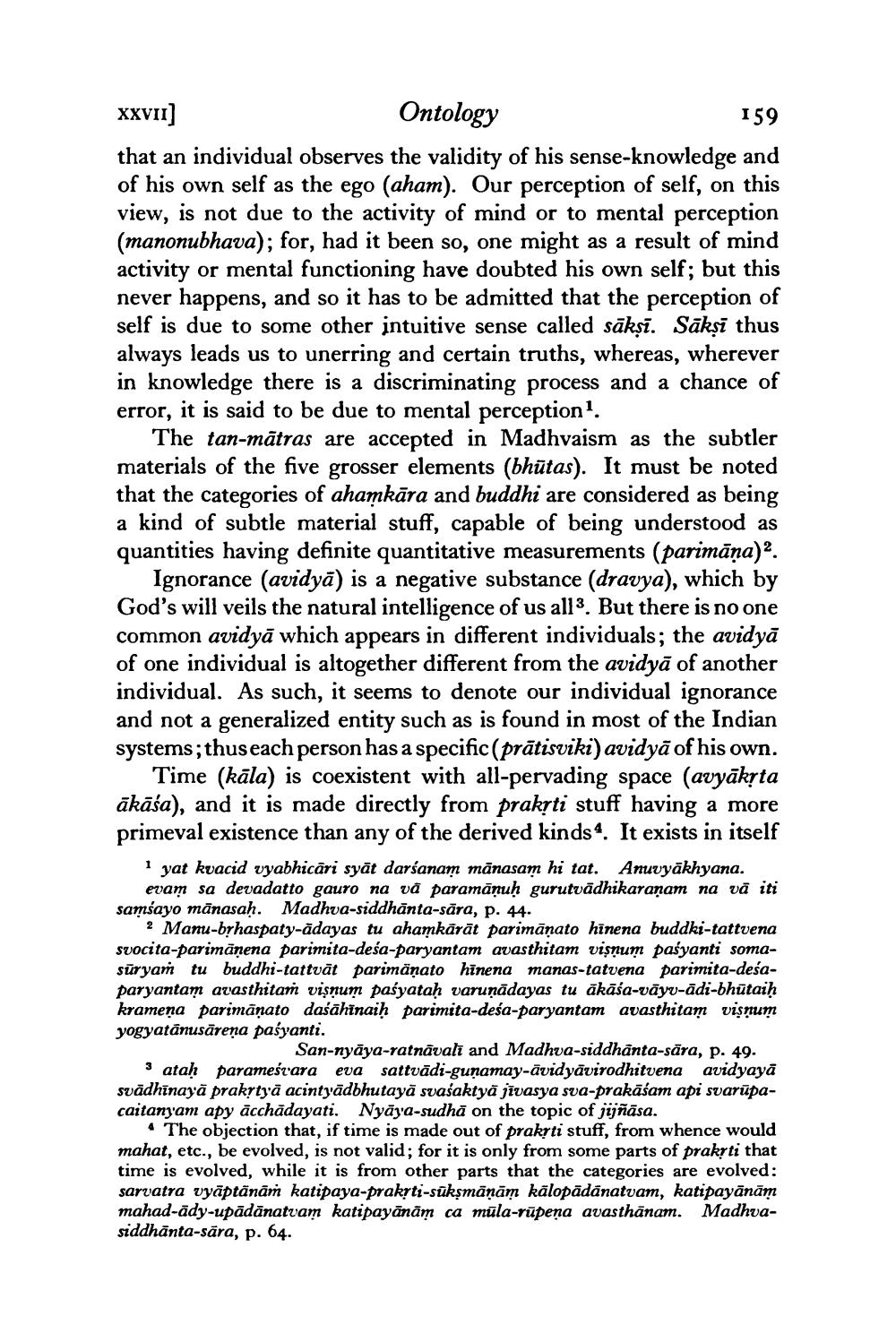________________
XXVII] Ontology
159 that an individual observes the validity of his sense-knowledge and of his own self as the ego (aham). Our perception of self, on this view, is not due to the activity of mind or to mental perception (manonubhava); for, had it been so, one might as a result of mind activity or mental functioning have doubted his own self; but this never happens, and so it has to be admitted that the perception of self is due to some other intuitive sense called sākṣī. Sākṣi thus always leads us to unerring and certain truths, whereas, wherever in knowledge there is a discriminating process and a chance of error, it is said to be due to mental perception?.
The tan-mātras are accepted in Madhvaism as the subtler materials of the five grosser elements (bhūtas). It must be noted that the categories of ahamkāra and buddhi are considered as being a kind of subtle material stuff, capable of being understood as quantities having definite quantitative measurements (parimāna) 2
Ignorance (avidyā) is a negative substance (dravya), which by God's will veils the natural intelligence of us all. But there is no one common avidyā which appears in different individuals; the avidyā of one individual is altogether different from the avidyā of another individual. As such, it seems to denote our individual ignorance and not a generalized entity such as is found in most of the Indian systems; thus each person has a specific(prātisviki) avidyā of his own.
Time (kāla) is coexistent with all-pervading space (avyāksta ākāśa), and it is made directly from praksti stuff having a more primeval existence than any of the derived kinds 4. It exists in itself
1 yat kvacid vyabhicari syāt darśanam mānasam hi tat. Anuvyakhyana.
evam sa devadatto gauro na vā paramānuh gurutvādhikaranam na vā iti samsayo mānasah. Madhva-siddhānta-sāra, p. 44.
2 Manu-brhaspaty-ādayas tu ahamkārāt parimāņato hinena buddki-tattvena svocita-parimānena parimita-desa-paryantam avasthitam visnum paśyanti somasūryam tu buddhi-tattvāt parimänato hinena manas-tatvena parimita-desaparyantam avasthitam vişnum paśyataḥ varuņādayas tu ākāśa-vāyv-ādi-bhūtaiḥ kramena parimānato daśāhinaiḥ parimita-deśa-paryantam avasthitam visnum yogyatānusārena paśyanti.
San-nyāya-ratnāvali and Madhva-siddhanta-sära, p. 49. 3 atah parameštara eva sattvādi-gunamay-āvidyāvirodhitvena avidyayā svādhīnayā praktyā acintyādbhutayā svasaktyā jīvasya sva-prakāśam api svarūpacaitanyam apy ăcchādayati. Nyāya-sudhā on the topic of jijñāsa.
4 The objection that, if time is made out of prakrti stuff, from whence would mahat, etc., be evolved, is not valid; for it is only from some parts of prakti that time is evolved, while it is from other parts that the categories are evolved: sarvatra vyāptānāṁ katipaya-prakrti-sūksmāņām kālopādānatvam, katipayānām mahad-ady-upādānatvam katipayānām ca müla-rūpena avasthānam. Madhvasiddhānta-sāra, p. 64.




